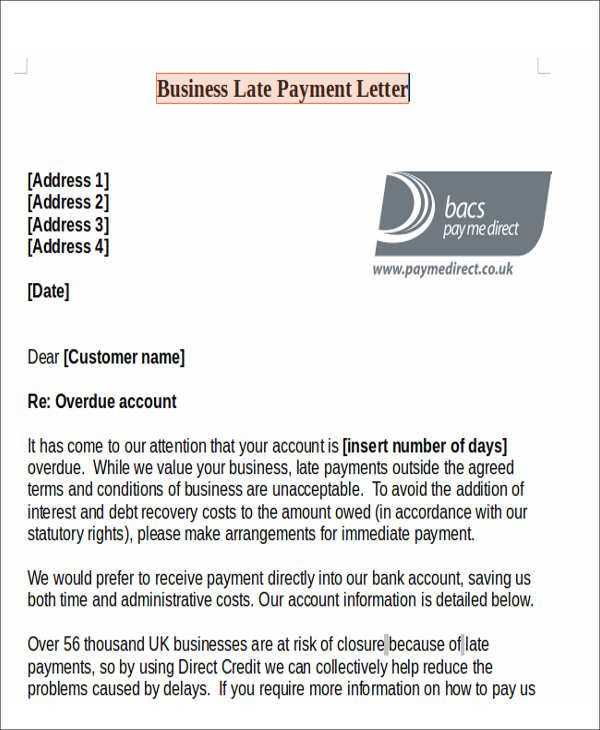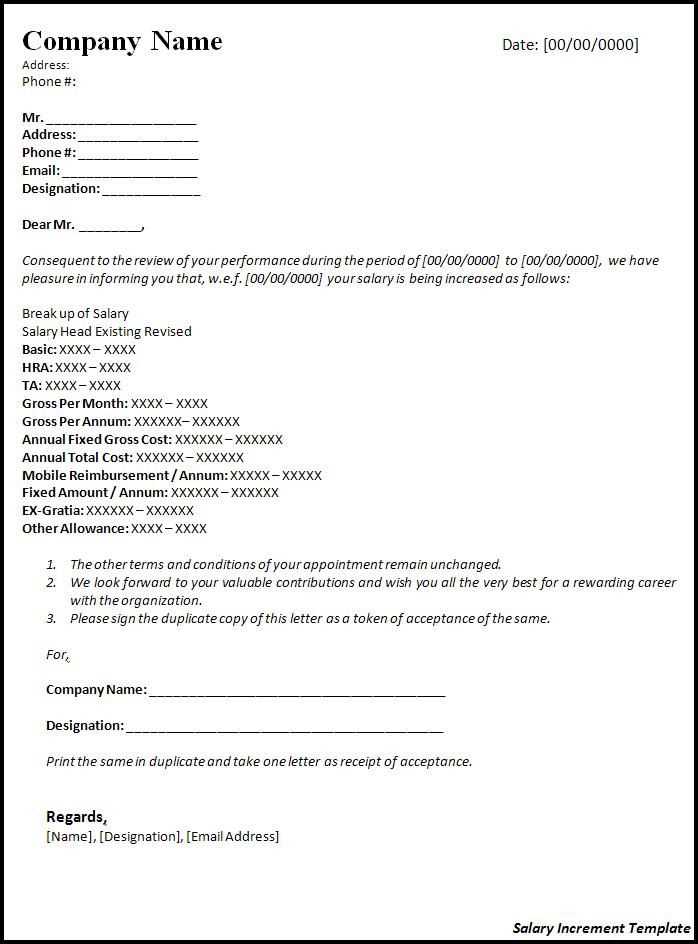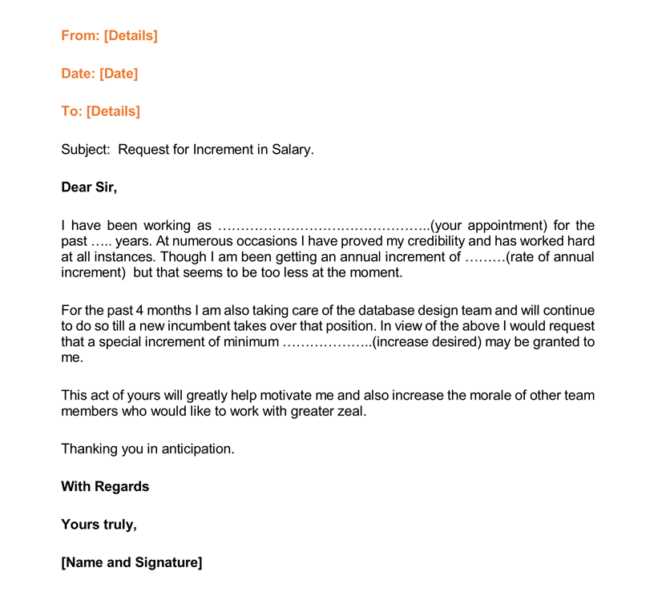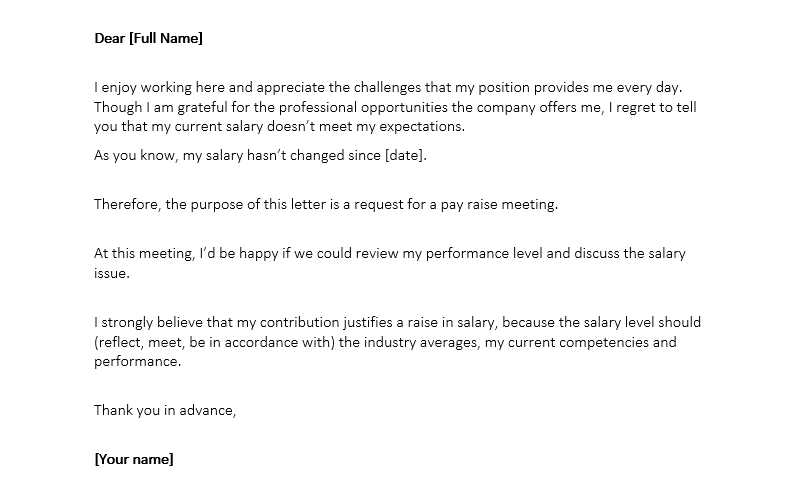Template for Pay Rise Letter Example and Tips

Asking for a salary increase is a significant step in one’s professional journey. It requires preparation, confidence, and a strategic approach to ensure the request is received positively. Understanding the right approach can help increase your chances of success while maintaining a professional relationship with your employer.
In this guide, you will find important insights on how to frame your request effectively. From structuring your message to highlighting your achievements, each element plays a crucial role in making a compelling case. It’s essential to present your argument clearly, backed by specific examples of your contributions and value to the company.
By using the right language and tone, you can approach the situation with confidence. Whether you choose to discuss your current role, future goals, or market trends, your communication should remain respectful and professional at all times. Properly handling such requests will help ensure a productive conversation and a positive outcome.
How to Craft a Pay Rise Request
When asking for a salary adjustment, it is important to approach the conversation with clarity and precision. The way you present your request can have a significant impact on the outcome. A well-crafted message should not only highlight your achievements but also demonstrate your understanding of the company’s goals and needs. It’s essential to build a strong case that justifies your request while maintaining professionalism throughout the process.
Start with a Clear Introduction
Begin by expressing your appreciation for the opportunities you’ve been given and the value you bring to the organization. Acknowledging your contributions sets a positive tone for the discussion. Be direct, but courteous, and provide a brief overview of why you’re initiating the conversation. This ensures the employer understands your motivations and respects your professional approach.
Present Evidence of Your Contributions
To strengthen your argument, include specific examples of your achievements, such as successful projects, increased responsibilities, or positive feedback from colleagues. This will demonstrate your growth within the role and your continued commitment to the company. Highlighting measurable outcomes, like improvements in productivity or cost-saving initiatives, can also provide concrete evidence of your impact.
Key Elements to Include in Your Letter
When requesting a salary adjustment, it is crucial to provide a clear, structured message. Including the right information ensures that your request is taken seriously and that you present yourself as a strong candidate for the change. Focus on the key aspects that highlight your value to the company while ensuring your tone remains professional and respectful throughout.
Professional Introduction
Start by introducing yourself and stating the purpose of your communication. Be polite and direct, ensuring your employer understands the reason for the conversation right away. Mention your current role and length of service to set context for the discussion.
Supporting Evidence
To make a compelling case, include evidence that supports your request. This can include specific accomplishments, milestones, and positive feedback from colleagues or supervisors. Using measurable results, such as increased sales or successful project completions, will help back up your request with hard facts.
| Element | Description |
|---|---|
| Introduction | Clearly state the purpose of the request and introduce yourself professionally. |
| Contributions | Provide specific examples of your achievements and how they benefit the company. |
| Market Comparison | Optional: Mention industry standards or benchmarks to show you are asking within reasonable limits. |
| Conclusion | End by reiterating your appreciation and expressing your hope for a positive outcome. |
Understanding the Right Timing for Requests
Choosing the right moment to bring up a request for a salary adjustment is essential. Timing can significantly affect the response, and knowing when to approach the subject is just as important as how you present your case. Understanding your company’s financial cycles, recent achievements, and your role within the team can help you decide the best time to make your request.
Company Financial Health
It’s important to consider your organization’s current financial situation when making such a request. If the company is experiencing financial challenges, it may not be the best time to ask. However, if the business is thriving, especially after a successful quarter or year, your chances of success are higher. Pay attention to public financial reports or internal updates to gauge the company’s stability.
Personal Performance Milestones
Another key factor is your own performance. If you’ve recently taken on new responsibilities, achieved significant goals, or contributed to the company’s success, these are strong indicators that you’ve earned the right to ask. Requesting an adjustment after completing a major project or hitting a key milestone can give your request more weight and demonstrate your ongoing commitment to the company’s success.
Common Mistakes to Avoid When Asking

When requesting a salary adjustment, certain mistakes can undermine your efforts and reduce your chances of success. Being aware of these common pitfalls can help you approach the conversation in a more effective and professional manner. Avoiding missteps ensures that your request is heard and considered seriously by your employer.
Being Vague About Your Request
One of the biggest mistakes is not being specific about what you are asking for. A vague request can leave your employer uncertain about your expectations and may be seen as unprepared or uninformed. Instead, clearly articulate the adjustment you are seeking and justify it with concrete reasons, such as your achievements or increased responsibilities.
Bringing Up Personal Financial Issues
It’s important to avoid mentioning personal financial problems or needs as a reason for requesting an increase. While this may seem like a natural explanation, it doesn’t strengthen your professional case. Instead, focus on your work performance, contributions to the company, and market standards to build a more compelling argument.
How to Maintain Professional Tone

Maintaining a professional tone is crucial when discussing a salary adjustment. The way you communicate your request can have a significant impact on how it is received. It’s important to strike a balance between being confident in your worth and respectful towards your employer. The tone should reflect professionalism, gratitude, and an understanding of your employer’s position.
First, ensure that your language is respectful and courteous. Avoid sounding entitled or demanding, and instead, frame your request as a thoughtful and well-reasoned conversation. Additionally, use clear and concise language, sticking to the facts and avoiding emotional appeals. Being direct yet polite helps to convey your message without unnecessary complications or misunderstandings.
Lastly, be open to discussion. While maintaining a professional tone, it’s essential to express that you are open to feedback and willing to engage in a constructive conversation about your request. A collaborative approach often leads to a more positive and productive outcome.
Examples of Effective Pay Rise Letters
Reviewing examples of well-crafted requests can provide valuable insight into how to structure your own message. Effective communications focus on key points such as accomplishments, specific contributions to the company, and a professional tone. Below are a few examples to guide you in drafting your own request for an adjustment in compensation.
Example 1: Focus on Performance and Achievements
This example highlights the employee’s recent successes and contributions, making a strong case for an adjustment:
- Start by introducing yourself and the purpose of your request.
- List the major accomplishments that demonstrate your value to the company.
- Include measurable results such as increased sales, successful project completions, or positive feedback from clients.
- Conclude with a polite and respectful request, showing openness to further discussion.
Example 2: Emphasizing New Responsibilities
This example focuses on the additional responsibilities the employee has taken on since their last compensation review:
- Begin by expressing gratitude for the opportunities provided by the company.
- Explain how your role has expanded and the new tasks or projects you’ve taken on.
- Provide evidence that you’ve successfully managed these new responsibilities.
- Politely request an adjustment to reflect your increased workload.
Example 3: Referencing Industry Standards

In this example, the employee uses industry salary benchmarks to justify their request:
- Open by expressing appreciation for your time with the company.
- Mention the industry standard salary for your role and how it aligns with your skills and experience.
- Point out how your contributions and performance match or exceed those expectations.
- Conclude with a respectful request for an adjustment, referencing the market comparison.
Negotiation Tips After Sending Your Letter

Once your request has been submitted, the next crucial step is navigating the negotiation process. This phase can determine whether your request is accepted, rejected, or met with counteroffers. Approaching the conversation with confidence, preparation, and flexibility is essential. Below are some tips to ensure a productive discussion after your request has been made.
Prepare for Possible Responses
Anticipating different outcomes will help you remain calm and ready to engage in constructive dialogue. Be prepared for any of the following responses:
- Approval: If your request is accepted, be sure to express gratitude and confirm the details.
- Counteroffer: If a counteroffer is made, carefully evaluate it and be prepared to negotiate further if necessary.
- Rejection: If your request is declined, ask for feedback and inquire about potential future opportunities for growth.
Maintain Professionalism Throughout the Negotiation
Regardless of the response you receive, it’s important to keep the conversation respectful and professional. Here’s how to maintain a positive tone:
- Stay calm: If the discussion becomes challenging, remain composed and avoid emotional reactions.
- Listen actively: Show that you value your employer’s perspective and listen to their reasoning for any decisions made.
- Be open to compromise: Consider non-monetary options, such as additional responsibilities or benefits, if a salary increase is not possible.
Follow Up After the Discussion
After the negotiation meeting, it’s important to send a follow-up email to confirm any agreements or next steps. This helps ensure that both parties are aligned and that the conversation remains professional.